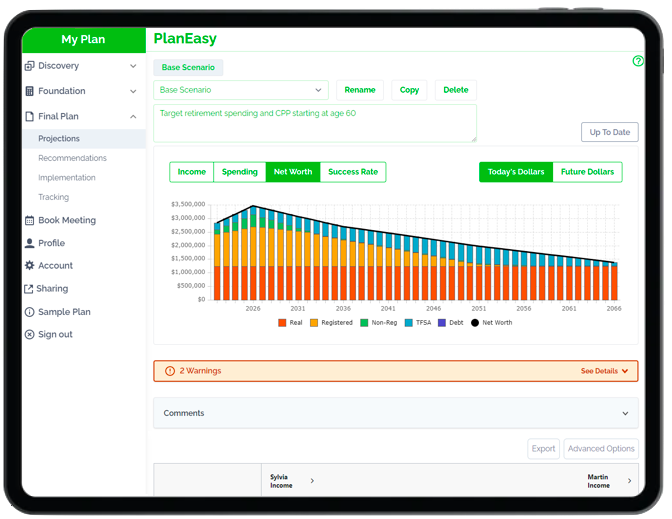How Much Does Your Vehicle Actually Cost Each Year?
How much does your vehicle actually cost each year? It’s likely more than you think. With insurance, gas/fuel, maintenance, licensing, future upgrades etc. the list of vehicle related expenses is quite long.
As a general rule of thumb, the average household spends about 15% of their net income on transportation. That’s a lot of money! That basically means 15% of our working lives is dedicated to spending on transportation.
If the average family with children has net income of around $105,000 per year in Canada, that means the average family is spending approximately $15,750 per year on transportation costs!
If that spending carries forward into retirement, that $15,750 per year in annual spending would require a nest egg of $393,750 just to support the same level of spending in retirement.
So, not only will this family spend $15,750 per year on transportation, but they’ll also need to save up $393,750 before retirement to support that spending in the future too!
Spending $15,750 per year on transportation might seem like a lot of money, but as we’ll see, it’s pretty easy to get there depending on the choices you make…
Monthly Vehicle Expenses
There are lots of expenses that come with vehicle ownership and two major monthly expenses are insurance and fuel/gas (and depending on where you live there could be additional costs as well).
Insurance costs can be steep (and seem to be constantly increasing!). Depending on your age, driving history, where you live, and the type of vehicle you drive, insurance costs could range from $70 to $200+ per month or $840 to $2,400+ per year.
Similarly, fuel costs will depend on fuel efficiency and kms driven. A fuel-efficient vehicle might burn 8L per 100km at $1.50 per L, that works out to $12 per 100km driven. Driving 10,000km to 20,000 km per year would result in fuel costs of $1,200 to $2,400 per year.
A larger and less fuel-efficient vehicle might burn 12L per 100k which works out to $18 per 100km. Driving 10,000km to 20,000 km per year would result in fuel costs to $1,800 to $3,600 per year for a larger and less fuel-efficient vehicle.
Wondering how your vehicle stacks up on fuel efficiency? This guide from Natural Resources Canada shows the fuel-efficiency statistics for nearly every new vehicle in production (our Honda Fit does quite well at 6.5L per 100km average, how does your vehicle do?)
On top of insurance and fuel costs, for those in a major city parking can easily exceed insurance costs on a monthly basis. Just the privilege of having your vehicle sit there all day can cost hundreds per month.
Just the monthly cost of owning a vehicle will be $2,000 to $5,000+ per year.
Vehicle Licensing
The second cost that isn’t quite as frequent or quite as large is vehicle licensing fees. This varies across the country but in Ontario this adds up to approximately $10 per month per vehicle.
Each year that adds $120 to the cost of owning a vehicle.
Vehicle Repairs And Maintenance
Owning a vehicle also means dealing with repairs and maintenance. Eventually things will need to be repaired and maintained. Not doing regular maintenance will only lead to more issues down the road.
Vehicle maintenance costs vary depending on the make, model, and age of the vehicle. Some vehicles are quite reliable while others seem to require constant maintenance. The quality/history of the vehicle has a big impact on future maintenance costs and there are many calculators available online that can help you estimate maintenance costs based on the particular vehicle you own.
A good average is $0.05 per km driven, but for some vehicles this can be over $0.08 per km or more. You can get an idea of your vehicle maintenance costs by using this calculator from CAA.
At $0.05 per km driving 10,000 km per year will result in average maintenance costs of $500 per year. This includes things like oil changes, new tires, and unexpected repairs.
Driving more usually means more maintenance costs. At 30,000 km per year the cost is now $1,500 per year for the average vehicle and as much as $2,400+ per year for less reliable vehicles.
Vehicle Upgrades
The last and largest vehicle expense is upgrades. Periodically it will be necessary to upgrade to a new (or newer) vehicle as your old vehicle depreciates.
Depending on the total cost of the new vehicle and the frequency of upgrades this can quickly add up.
A modest vehicle upgrade budget might be a used vehicle for $25,000 with a $5,000 trade in every 10-years. After adding sales tax on the difference this monthly cost is a reasonable $188 per month or $2,260 per year.
An average vehicle upgrade budget might be closer to $45,000 with a $15,000 trade in every 7-years. This averages out to $404 per month or $4,843 per year.
A higher end vehicle upgrade budget might be an $80,000 vehicle with $30,000 trade in every 5-years. This works out to $942 per month or $11,300 per year.
Depending on your upgrade frequency and the type of vehicle you own, the cost of upgrades can easily reach $1,000 per month or $12,000 per year.
Ways To Reduce Your Vehicle Costs
Adding up all the costs can be both scary and enlightening. It’s quite easy to see how the average family could spend $15,750 per year on transportation costs. But what if you have better places to spend that money? What if you’d rather spend that money on more vacations or saving for retirement? How can you reduce your vehicle costs?
There are a few ways to reduce the cost of vehicles in the future…
Own fewer of them: One easy way to reduce vehicle costs is just to own fewer of them. Instead of owning two vehicles you can own one, instead of one vehicle you can go carless. Of course, depending on where you live, and your access to alternative transportation, this is easier said than done.
Drive them less frequently: An alternative to owning fewer vehicles is to drive them less frequently. Try using alternative options like biking, walking, car sharing, public transit etc. This provides an immediate reduction in costs as you reduce fuel and maintenance costs, but most other costs will remain the same. The other benefit of using your vehicle less is that you may find that you don’t actually need your vehicle at all, in this case owning fewer vehicles may actually become an option.
Buy used: Buying used versus new is another easy way to decrease the amount spent on vehicles. New vehicles tend to depreciate faster in the beginning which can make buying a used vehicle that is 2-3 years old a relatively good deal. This doesn’t always hold true however as there are periods where used vehicles are in higher demand and the benefit of buying used is lower.
Buy basic: The last way to save on vehicle costs is to buy a basic vehicle. If your vehicle is mainly there for utility, to provide transportation from point A to point B, then buying a basic vehicle instead of a larger or more expensive luxury vehicle is another easy way to save money. The added bonus is that basic vehicles are generally less expensive to maintain as well.
Blog post continues below...
Advice-Only Retirement Planning
Are you on the right track for retirement? Do you have a detailed decumulation plan in place? Do you know where you will draw from in retirement? Use the Adviice platform to generate your own AI driven retirement decumulation plan. Plan your final years of accumulation and decumulation. Reduce tax liability. Estimate "safe" vs "max" retirement spending. Calculate CPP, OAS, GIS, CCB etc. And much more!
Start your retirement plan for just $9 for 30-days!
You deserve financial peace of mind as you enter retirement. Start planning now!

How Much Does Your Vehicle Actually Cost Each Year?
So, how much does your vehicle actually cost each year? It’s likely more than you think. When you add up the various costs, and factor in the future cost of upgrades, it’s easy to see how a family spends $15,000+ per year on transportation costs.
Saving money on transportation isn’t necessarily easy but it can be a great way to accelerate savings goals. Making a few smart decisions around vehicle ownership can dramatically reduce the average monthly cost of owning a vehicle.
By bringing the annual cost down from $15,000 per year to $7,500 per year the average family could have an additional $380,000+ at retirement and/or potentially retire years earlier. That’s quite an incentive to reduce vehicle costs in the future!
Join over 250,000 people reading PlanEasy.ca each year. New blog posts weekly!
Tax planning, benefit optimization, budgeting, family planning, retirement planning and more...
Join over 250,000 people reading PlanEasy.ca each year. New blog posts weekly!
Tax planning, benefit optimization, budgeting, family planning, retirement planning and more...








0 Comments